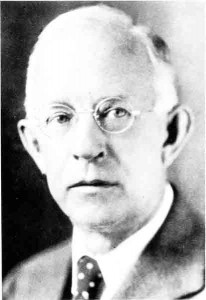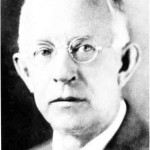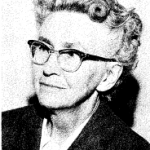Leadership in 1941

Ernest Groves, NCFR president 1941
¶ 1 Leave a comment on paragraph 1 0 During Ernest R. Groves’s tenure as NCFR President, membership increased, the deficit was liquidated, and dues were increased and, under Ernest Burgess’s editorship, the journal Living would receive a new name and thrust.
¶ 2 Leave a comment on paragraph 2 0 The following biography of Ernest R. Groves is adapted from the archives of North Dakota State University:
¶ 3 Leave a comment on paragraph 3 0 Ernest Rutherford Groves was born May 6, 1877 in Framingham, Massachusetts to Henry Hunt and Hannah Sweard Groves. He received his B.D. from Yale Divinity School in 1901 and his A.B. from Dartmouth College in 1903. Professor Groves later received honorary doctorate degrees from Florida Southern College in 1942 and from Boston University in 1946. Although Professor Groves served for a short time as a pastor in Maine, he soon began the teaching and research which would be his life’s work. Among the schools where he served as a faculty member were New Hampshire University, Dartmouth College, Boston University, Duke University, and the University of North Carolina. He served as Dean of the Liberal Arts College at New Hampshire University from 1914 to 1920. Professor Groves taught at the University of North Carolina from 1927 until the time of his death. He was also often a visiting lecturer at various schools.
¶ 4 Leave a comment on paragraph 4 0 A sociologist, Professor Groves developed the first college credit course in preparation for marriage (at Boston University in 1922, and at the University of North Carolina in 1927). He wrote the first college text on the subject, Marriage, in 1933.
¶ 5 Leave a comment on paragraph 5 0 A prolific author, Professor Groves wrote more than 20 books and nearly 200 articles and became one of the leading and most respected family life educators in this country. Professor Groves’s work appeared in the popular journals of the day (Look, Good Housekeeping, Parents Magazine) as well as the academic journals (Social Forces, Journal of Educational Sociology). He served on the editorial boards of many of these publications.
¶ 6 Leave a comment on paragraph 6 0 Professor Groves was the first president of the North Carolina Mental Hygiene Society, serving from 1936 to 1938. He was president of the National Conference on Family Relations in 1941. From 1938 to 1940, Groves was chairman of the Committee on the Family for the Federal Council of Churches of Christ in America. Throughout his career, Professor Groves was an active member in numerous national and state organizations for marriage, family life, and mental hygiene.
¶ 7 Leave a comment on paragraph 7 0 Professor Groves began the successful annual conferences on the Conservation of Marriage and the Family, at the University of North Carolina at Chapel Hill. Mrs. Groves had begun the conference at the North Carolina College for Negroes. They became affiliated in 1947. They eventually became known as the Groves Conference of Marriage and the Family, still in existence today.
¶ 8 Leave a comment on paragraph 8 0 It will be apparent, when reviewing the correspondence in particular, that Professor Groves was well loved and most respected. He was a compassionate, thoughtful man who gave generously of his time and expertise. Professor Groves devoted a great deal of his time to counseling patients, in person and via the mail. His work was progressive for its time; his advice is most often still applicable today.
¶ 9 Leave a comment on paragraph 9 0 Ernest Groves married Dorothy Doe, daughter of New Hampshire Chief Justice Charles Doe, in 1906. They had two daughters: Catherine Groves Peele, and Ernestine Groves O’Kane. Catherine also became a well-known educator and author and occasionally collaborated with her father and stepmother. Dorothy Doe Groves died in 1916. On February 25, 1919, Ernest married Gladys Hoagland. They also had two daughters: Ruth Elva Petrillo Groves, and Lois Mary Groves McGill.
¶ 10 Leave a comment on paragraph 10 0 Ernest Groves died August 29, 1946, in Arlington, MA, where he was on vacation from teaching summer school at Boston University.
¶ 11 Leave a comment on paragraph 11 0 The following is an excerpt from Groves‘s 1941 Presidential Address:
¶ 12 Leave a comment on paragraph 12 0 The role of the American family at the moment has no uncertainty. It must maintain with patience an unchanging courage, and with unstinted sacrifice continue as the basic source of the morale which alone can carry us through our present ordeal. No one in accord with the quality of American civilization would choose a family life responsive to our present emergency as a permanent domestic experience, but rather we are prepared to meet the social reconstruction and promise which will face us at the end of this unseasonable war. Speaking for myself, I look forward to a future family which will express the two characteristics that have been distinctive in the growth of our nation: an increasingly just relationship of men and women and an appreciation of the worth of individual integrity. I seek also a family life that will itself be supported by an advancing social maturity.
¶ 13 Leave a comment on paragraph 13 0
Gallery
- Ernest Burgess
- Ernest Groves, NCFR president 1941
- Gladys Hoagland Groves





Comments
0 Comments on the whole Page
Login to leave a comment on the whole Page
0 Comments on paragraph 1
Login to leave a comment on paragraph 1
0 Comments on paragraph 2
Login to leave a comment on paragraph 2
0 Comments on paragraph 3
Login to leave a comment on paragraph 3
0 Comments on paragraph 4
Login to leave a comment on paragraph 4
0 Comments on paragraph 5
Login to leave a comment on paragraph 5
0 Comments on paragraph 6
Login to leave a comment on paragraph 6
0 Comments on paragraph 7
Login to leave a comment on paragraph 7
0 Comments on paragraph 8
Login to leave a comment on paragraph 8
0 Comments on paragraph 9
Login to leave a comment on paragraph 9
0 Comments on paragraph 10
Login to leave a comment on paragraph 10
0 Comments on paragraph 11
Login to leave a comment on paragraph 11
0 Comments on paragraph 12
Login to leave a comment on paragraph 12
0 Comments on paragraph 13
Login to leave a comment on paragraph 13